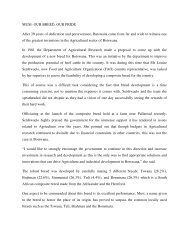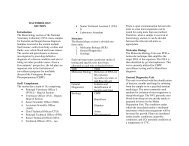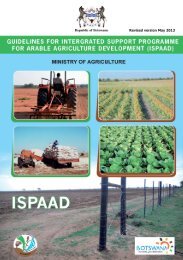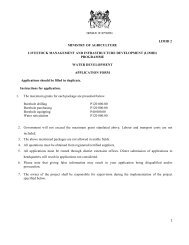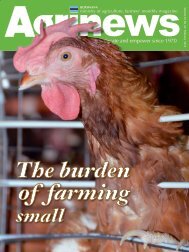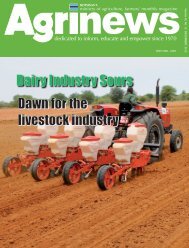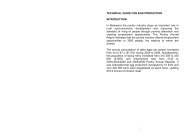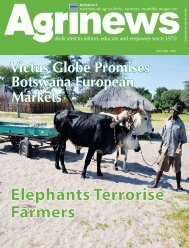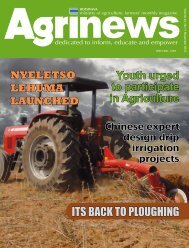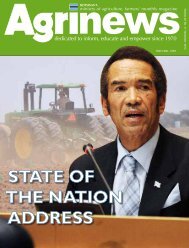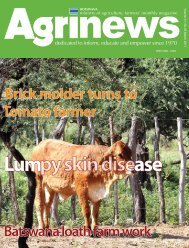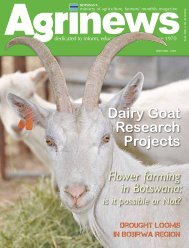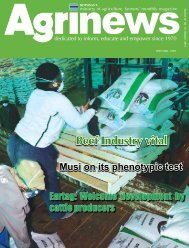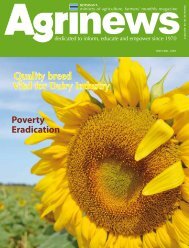Botswana's karakul renaissance - Ministry of Agriculture
Botswana's karakul renaissance - Ministry of Agriculture
Botswana's karakul renaissance - Ministry of Agriculture
Create successful ePaper yourself
Turn your PDF publications into a flip-book with our unique Google optimized e-Paper software.
“We Can not Feed the Nation from<br />
Idle Land” -President Khama tells<br />
Agricultural Pitso<br />
The President Sertetse Khama Ian Khama says<br />
he is disturbed by the amount <strong>of</strong> agricultural<br />
land which is lying uncultivated yet the<br />
country imports over 60% <strong>of</strong> most agricultural<br />
products.<br />
been controlled if more effort was exerted. He<br />
said that due to this Government is committed<br />
to assist only those farmers who have shown<br />
commitment in managing their fields.<br />
Dr Moetapele Letshwenyo<br />
Speaking at the forum the Assistant Minister<br />
Oreeditse Molebatsi said in any endeavour<br />
they embark on Batswana should adopt the<br />
motto <strong>of</strong> “agriculture first,” noting that one<br />
hectare <strong>of</strong> arable land could turn into a viable<br />
agricultural business.<br />
President Seretse Khama Ian Khama (L) and Moeng Pheto<br />
“We can not feed the nation from idle land<br />
therefore we have to invest in agriculture and<br />
manage the farming businesses to maximise<br />
pr<strong>of</strong>its,” he said.<br />
Officially opening the <strong>Ministry</strong> <strong>of</strong> <strong>Agriculture</strong><br />
Consultative forum {Pitso} , President<br />
Khama said his government has identified<br />
the agricultural sector as the main driver <strong>of</strong><br />
poverty eradication , noting that the sector be<br />
supported to ensure people have enough food<br />
and even export surplus.<br />
The theme for the Pitso was “Rethinking<br />
Agricultural Development: Focusing on<br />
Breakthrough Areas.”<br />
President Khama said the theme was<br />
appropriate as it comes at a time when the<br />
government want to revive the agricultural<br />
sector to enable it to pla a meaningful role<br />
in the development <strong>of</strong> the economy. The<br />
breakthrogh areas are dairy, horticulture,<br />
cereal and smallstock as well as bee keeping..<br />
These are farming enterprises the <strong>Ministry</strong><br />
wants to make a significant impact on, in the<br />
short to medium term.<br />
He said the Integrated Support Programme<br />
for Arable <strong>Agriculture</strong> Development {ISPAAD}<br />
which was introduced in July 2008 resulted<br />
in over two fold in cereal yields noting that<br />
through ISPAAD more can still be achieved if<br />
farmers can rise to the occasion and be more<br />
committed.<br />
Khama however said they are some farmers<br />
who do not look after their ploughed fields<br />
and consequently attain low yields as a result<br />
<strong>of</strong> weeds and bird damage that could have<br />
“I therefore call upon all arable farmer<br />
organisations to assist government in weeding<br />
out non-farmers from the ISPAAD programme,”<br />
he said.<br />
He said efforts to reduce the amount <strong>of</strong> goods<br />
and services imported are already bearing fruit,<br />
noting that under this initiative schools bought<br />
for the first time, local agriculture produce<br />
such as watermelons and green mealies for<br />
school feeding programmes this season.<br />
The <strong>Ministry</strong> <strong>of</strong> Local Government bought<br />
thousands <strong>of</strong> tonnes <strong>of</strong> grain from the<br />
Botswana Agricultural Marketing Board for its<br />
various feeding programmes.<br />
On dairy farming, President Khama said<br />
the government is aware <strong>of</strong> the high cost <strong>of</strong><br />
inputs associated with establishment <strong>of</strong> a dairy<br />
enterprise and as such he encourageddairy<br />
entrepreneurs to grow fodder with assistance<br />
from ISPAAD to reduce the feed bill as it is<br />
feed which is critical to the sustance <strong>of</strong> the<br />
dairy business.<br />
For his part, the Minister <strong>of</strong> <strong>Agriculture</strong><br />
Christiaan De Graaff said agriculture business<br />
is faced with challenges which may inhibt its<br />
growth and prosperity.<br />
He said the challenges are evident across the<br />
spectrum from primary production through<br />
processing and marketing all the way to the<br />
consumer.<br />
“It is important to note that these challenges are<br />
many and complex,” he said.<br />
De Graaff said the challenges vary from natural<br />
phenomenon such as climatic conditions to<br />
market related scenarios.<br />
Assistant Minister Molebatsi decried some<br />
dairy companies which have put their milk<br />
standards very high, higher than those <strong>of</strong><br />
Bureau <strong>of</strong> Standards Such companies, he said<br />
rejects milk from local farmers.<br />
Molebatsi said ISPAAD has proved that<br />
Batswana can produce enough food to feed<br />
the nation.<br />
When presenting on bee production a bee<br />
farmer, Mr. Ontiretse Mochangana decried<br />
lack <strong>of</strong> support from government as well as<br />
inadequate market outlets.<br />
Another farmer from the Southern District Mr<br />
Odirile Patle emphasised the importance soil<br />
testing before one embarks in arable farming.<br />
Tshepo Masire a beef producer said that one<br />
Pitso is not enough for them.<br />
He urged farmers to always be closer to their<br />
agricultural business entity, noting that they<br />
can not be good farmers when they stay very<br />
far from their cattle posts. He said water<br />
shortage is a problem in many districts and<br />
urged the government supply water to farmers.<br />
Masire said that they are many cattle in the<br />
Ngwaketsi district but the problem is lack <strong>of</strong><br />
infrastructure such as roads to supply to the<br />
BMC.<br />
For his part Mr. W Herbst, a dairy farmer<br />
said that they have a problem with milk by<br />
products adding that they are no processors<br />
who can assist them package and produce<br />
many products from the dairy. He is crying <strong>of</strong><br />
lack <strong>of</strong> support from the government<br />
Dr Moetapele Letshwenyo who was then<br />
acting Permanent Secretary emphasized<br />
proper management to the farmers<br />
Gaseboiwe Peter<br />
May 2010



